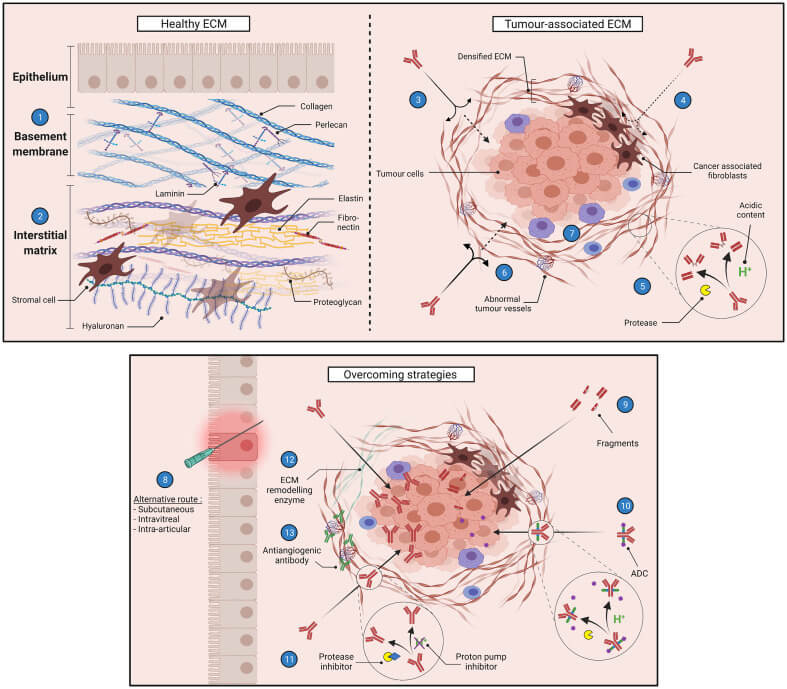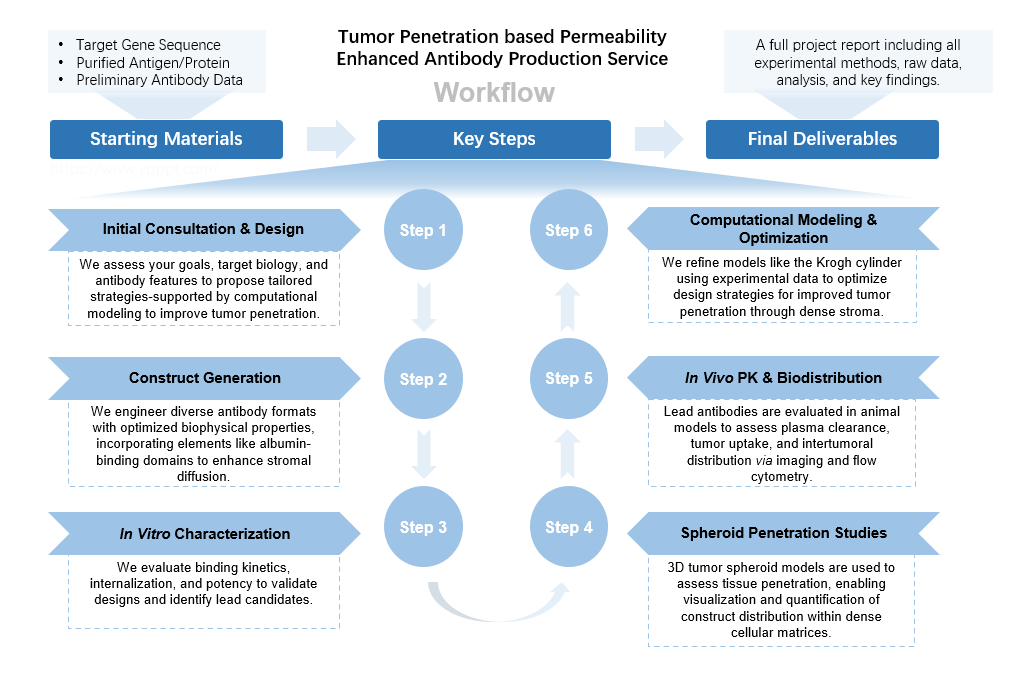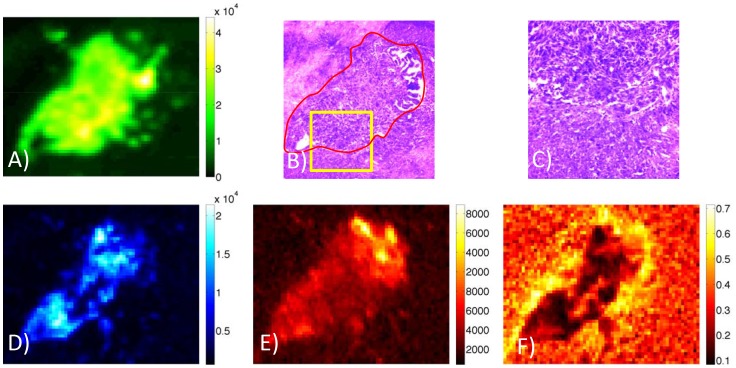Tumor Penetration-based Permeability Enhanced Antibody Production Service
Are you currently facing challenges with limited tumor penetration and heterogeneous drug distribution in your antibody-based therapies? Our tumor penetration-based permeability enhanced antibody production service helps you overcome these hurdles and maximize therapeutic efficacy through innovative protein engineering and advanced pharmacokinetic modeling.
Introduction
Tumor penetration is a critical determinant of therapeutic efficacy for antibody-based drugs in solid tumors. The "binding site barrier" and rapid internalization often restrict high-affinity antibodies to perivascular regions, limiting drug access to deeply situated cancer cells. Our service addresses this by engineering antibodies with optimized biophysical properties, including tailored affinity and molecular size, to overcome these transport limitations. By enhancing uniform distribution within the tumor, we aim to maximize the delivery of lethal payloads to a broader population of tumor cells, as supported by published data emphasizing the role of penetration over sole in vitro potency or total tumor uptake.
 Fig.1 Barriers encountered by antibodies in the tumor microenvironment.1,3
Fig.1 Barriers encountered by antibodies in the tumor microenvironment.1,3
Tumor Penetration-based Permeability Enhanced Antibody Production Service at Creative Biolabs
Creative Biolabs' tumor penetration-based permeability enhanced antibody production service delivers optimized antibody constructs designed for superior intratumoral distribution and enhanced cellular targeting. We provide solutions to critical issues such as the "binding site barrier" effect and rapid off-target clearance, ensuring your therapeutic agents reach a greater proportion of cancer cells with a lethal payload dose.
Specifically, we focus on tumor penetration optimization by strategically modifying antibody size, charge, or binding properties to improve their access and distribution within the dense stromal environments often found in solid tumors. Our service is tailored to improve the in vivo efficacy of your antibody-drug conjugates (ADCs) and other protein-drug conjugates, translating to more effective cancer treatments.
Service Process

Key Advantages
- Tailored Design Strategies: We don't believe in one-size-fits-all. Our experts meticulously assess your specific target, existing antibody, and therapeutic goals to design customized antibody constructs that precisely address tumor penetration challenges.
- Advanced Engineering Techniques: Leveraging state-of-the-art protein engineering, we create novel antibody formats, including single-domain antibodies and modified IgGs, incorporating features like albumin-binding domains to achieve optimal pharmacokinetics and enhanced tumor distribution.
- Comprehensive Characterization: From in vitro binding kinetics and cellular internalization assays to advanced 3D spheroid penetration studies and in vivo biodistribution, we provide a full spectrum of data to thoroughly characterize your engineered antibodies.
- Integrated Computational Modeling: Our sophisticated computational models are integrated throughout the workflow, allowing for predictive analysis and iterative optimization of antibody design parameters, ensuring the most effective strategies for maximizing tumor penetration.
- Real-World Efficacy Focus: Our ultimate goal is to enhance in vivo therapeutic efficacy. We prioritize designs that ensure a lethal payload reaches the maximum number of tumor cells, moving beyond simple tumor uptake metrics to deliver truly impactful solutions.
- Dedicated Expert Support: Our team of experienced biology specialists works closely with you, providing scientific guidance and transparent communication at every stage of your project, ensuring your specific needs are met with precision and expertise.
Representative Data
Summary: This study compares a small fluorescent protein (~7 kDa) and a full-sized antibody (cetuximab, ~150 kDa) for imaging glioma tumor margins. In mouse models with human gliomas, both tracers targeted EGFR, but the fluorescent protein penetrated the tumor edges better. Although cetuximab had higher affinity and longer blood retention, its size limited its spread to the tumor periphery. The smaller protein showed more uniform distribution, especially in areas where the blood-brain barrier was less disrupted. These results suggest smaller probes may be more effective for tumor margin detection during brain surgery.
 Fig.2 Distribution of antibodies in the tumor region.2,3
Fig.2 Distribution of antibodies in the tumor region.2,3
FAQs
How does Creative Biolabs' service address the "binding site barrier" effect?
The "binding site barrier" occurs when high-affinity antibodies bind rapidly to perivascular cells, preventing deeper penetration. Our service designs antibodies with optimized binding kinetics and molecular size, allowing them to diffuse more effectively through the tumor microenvironment before binding, ensuring broader distribution.
Can your service help if my current antibody has a very high in vitro potency but limited in vivo efficacy?
Absolutely. Our research and published data indicate that high in vitro potency doesn't always translate to in vivo success if tumor penetration is poor. We focus on enhancing the antibody's ability to reach a maximum number of cells with a lethal dose, which often correlates more strongly with in vivo efficacy, even if it means adjusting in vitro potency.
What types of antibodies can be optimized for enhanced tumor penetration?
Our platform is versatile and can optimize various antibody formats, including conventional IgGs, single-domain antibodies, and antibody fragments. We assess the unique characteristics of each format to design constructs best suited for improved permeability and therapeutic delivery.
How do you ensure the enhanced permeability doesn't compromise other critical antibody properties like half-life?
We employ strategies such as integrating albumin-binding domains, which can significantly extend plasma half-life without negatively impacting extravasation or tissue penetration. Our multi-parameter optimization ensures a balanced profile that maximizes both tumor targeting and systemic exposure.
How does your service compare to simply increasing the dose of an existing antibody?
Simply increasing the dose of an antibody with poor penetration often leads to increased systemic toxicity without significantly improving intratumoral distribution. Our service provides a more strategic and effective approach by engineering the antibody itself for optimal penetration, leading to better efficacy at potentially lower, safer doses.
Why Choose Us?
Creative Biolabs is dedicated to advancing your therapeutic programs with innovative solutions. Our tumor penetration-based permeability enhanced antibody production service is designed to address the critical challenge of drug delivery in solid tumors, providing you with optimized antibody constructs for superior efficacy. Reach out to our expert team today to discuss your specific project needs and discover how we can help you achieve your therapeutic goals.
Contact us for more information and to discuss your project.
References
- Al Ojaimi, Yara et al. "Therapeutic antibodies - natural and pathological barriers and strategies to overcome them." Pharmacology & therapeutics vol. 233 (2022): 108022. DOI: https://doi.org/10.1016/j.pharmthera.2021.108022
- Sexton, Kristian et al. "Fluorescent affibody peptide penetration in glioma margin is superior to full antibody." PloS one vol. 8,4 e60390. 12 Apr. 2013. DOI: https://doi.org/10.1371/journal.pone.0060390
- Distributed under Open Access License CC BY 4.0, without modification.
For research use only. Not intended for any clinical use.
This site is protected by reCAPTCHA and the Google Privacy Policy and Terms of Service apply.

